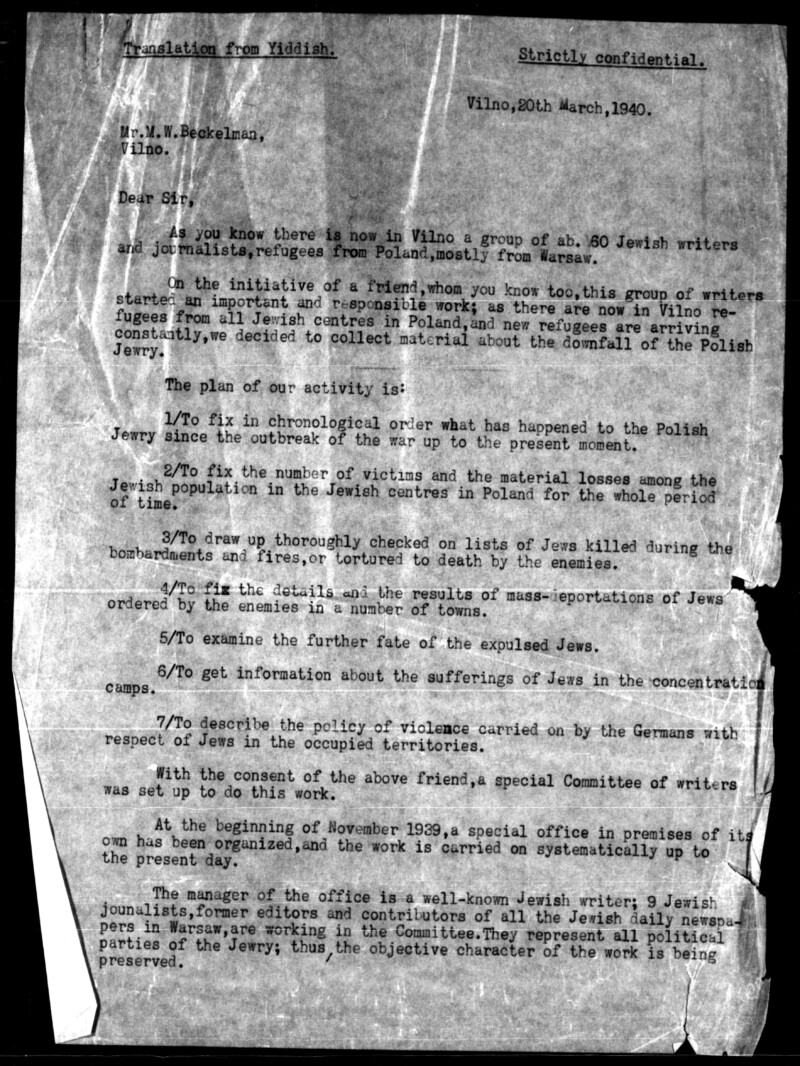Internationale Konferenz der deutschen Emigranten am 19./20.6., Paris
Satzungen der
Association des Emigrés Israélites d’Allemagne en France.
1. Teil: Allgemeine Bestimmungen.
Art. 1 – Die Association des Emigrés Israélites d’Allemagne en France ist ein angemeldeter Verein gemaess den Bestimmungen des Art. 5 des Gesetzes vom 1. Juli 1901 und unterliegt den Bestimmungen dieses Gesetzes sowie den nachfolgenden Satzungen.
Art. 2 – Die Vereinigung hat zur Aufgabe, die israelitischen Fluechtlinge aus Deutschland zusammenzuschliessen und ihre gemeinsame wirtschaftlichen Interessen in Einklang mit den allgemeinen Interessen der franzoesischen Nation zu setzen. Um dieses Ziel zu erreichen, ist sie bemueht:
a) diejenigen Mittel zu suchen und anzuwenden, die geeignet sind, die geistige und materielle Lage ihrer Mitglieder zu verbessern und ihre Anpassung an das soziale und wirtschaftliche Leben Frankreichs zu erleichtern. Bei dieser Wirksamkeit wird die Vereinigung stets in voller Uebereinstimmung mit allen franzoesischen Behoerden handeln;
b) ihren Mitgliedern in der Verteidigung ihrer wirtschaftlichen Rechte beizustehen und deren gegenseitige Hilfe zu organisieren;
c) die soziale, geistige und sportliche Taetigkeit ihrer Mitglieder zu unterstuetzen und die freundschaftlichen Beziehungen untereinander zu pflegen.
Art. 3 – Jede politische Taetigkeit sowohl der Vereinigung selbst wie der Mitglieder innerhalb der Vereinigung ist ausdruecklich untersagt. Die Vereinigung verpflichtet ihre Mitglieder, die franzoesischen Gesetze und die Sitten des Landes gewissenhaft zu achten.
Art. 4 – Der Sitz der Vereinigung ist Paris.
Art. 5 – Die Dauer der Vereinigung ist unbegrenzt.
2. Teil: Mitglieder, Beitraege.
Art. 6 – Jedermann kann Mitglied der Vereinigung werden, sofern der Vorstand die Aufnahme bewilligt; der Vorstand kann die Aufnahme bei Angabe von Gruenden verweigern.
[S. 2]
Art. 7 – Jedes Mitglied ist zur Zahlung eines Mitgliedbeitrages verpflichtet. Der Betrag ist auf 4,– frs. monatlich fuer ein Einzelmitglied, und auf 6,– frs. fuer eine Familie festgesetzt.
Jedoch ist der Vorstand berechtigt, den Mitgliedsbeitrag ganz allgemein oder in besonderen Faellen, sofern er es fuer angebracht erachtet, herabzusetzen.
Art. 8 – Der Vorstand kann denjenigen zum Ehrenmitglied ernennen, der sich um die Vereinigung besonders verdient gemacht hat.
Art. 9 – Der Austritt aus der Vereinigung kann jederzeit erfolgen, sofern der bereits faellige Mitgliedsbeitrag und der Beitrag fuer das laufende Jahr bezahlt ist.
Art. 10 – Der Vorstand ist berechtigt, die Streichung eines Mitgliedes vorzunehmen,
a) wenn das Mitglied seinen Wohnort gewechselt hat, ohne seine neue Adresse anzugeben,
b) wenn das Mitglied mit seinen Beitraegen laenger als drei Monate in Rueckstand ist und wenn die geschuldete Summe nicht binnen einem Monat nach Erhalt eines eingeschriebenen Briefes entrichtet ist, in dem auf die Folgen der Nichtzahlung hingewiesen ist,
c) wenn das Mitglied durch sein Verhalten entweder die Satzungen oder die Interessen der Vereinigung verletzt hat oder wenn ein anderer wichtiger Grund vorliegt.
Art. 11 – Die Streichung wird dem betreffenden Mitglied, sofern seine Adresse bekannt ist, durch eingeschriebenen Brief mitgeteilt. Die Streichung wird wirksam mit ihrer Vornahme selbst. Jedes gestrichene Mitglied hat jedoch das Recht, innerhalb eines Monats nach der Mitteilung an die Generalversammlung zu appellieren.
Die Streichung hat keinen Einfluss auf die Verpflichtung zur Zahlung der faelligen Mitgliedsbeitraege sowie der Beitraege fuer das laufende Jahr.
3. Teil. Verwaltung der Vereinigung.
Art. 12 – Der Vorstand besteht aus mindestens drei und hoechstens sieben Mitgliedern. Er ist berechtigt, sich bis zur Hoechstzahl von sieben Mitgliedern durch Kooptation zu ergaenzen, die Aemter unter sich zu verteilen und die Art seiner Geschaeftsfuehrung zu regeln.
Art. 13 – Die ordentliche Generalversammlung aller Mitglieder tritt regelmaessig im ersten Vierteljahr jeden Jahres zusammen. Sie nimmt den Vorstandsbericht entgegen und waehlt den Vorstand. Jedes ausscheidende Mitglied des Vorstandes kann wiedergewaehlt werden.
[S. 3]
Art. 14 – Der Vorstand ist befugt, eine ausserordentliche Generalversammlung einzuberufen, sofern er es fuer zweckmaessig erachtet. Er ist dazu verpflichtet, sofern 20 Mitglieder dies schriftlich unter Angabe der Tagesordnung verlangen.
Art. 15 – Die Einladungen sowohl zu einer ordentlichen wie einer ausserordentlichen Generalversammlung haben schriftlich zu erfolgen unter summarischer Angabe der Tagesordnung. Die Einladungen sind acht Tage vor der Sitzung abzusenden. Fuer die Mitglieder, die einer Familie angehoeren, kommt nur eine gemeinsame Einladung zum Vorstand; jedoch hat jedes anwesende Mitglied gesondertes Stimmrecht.
Art. 16 – Der Vorstand ist verpflichtet, einen Gegenstand auf die Tagesordnung zu setzen, wenn dieser ihm einen Monat vor der Sitzung schriftlich von zehn Mitgliedern unterschrieben angezeigt wird.
Art. 17 – In jeder Mitgliederversammlung koennen ein oder mehrere, hoechstens jedoch drei Mitglieder zur Kassenpruefung bestimmt werden.
Art. 18 – Eine Statutenaenderung oder die Aufloesung der Vereinigung kann, sofern dieser Gegenstand auf der Tagesordnung steht, nur mit einer Stimmenmehrheit von zwei Dritteln der anwesenden Mitglieder vorgenommen werden.
Art. 19 – Im Falle der Aufloesung bestimmt die Generalversammlung ueber die Verwendung des Vereinsvermoegens und bezeichnet einen oder mehreren Liquidatoren.
Art. 20 – Der Vorstand hat die Formalitaeten der Anmeldung und der vorgeschriebenen Veroeffentlichungen gemaess dem Gesetze vom 1. Juli 1901 und dem Dekret vom 16. August 1901 zu erledigen. Zu diesem Zwecke sind die erforderlichen Vollmachten auf einen Delegierten des Vorstandes uebertragen.
International Conference of German Emigrants on 19-20 June, Paris
Statutes of the
Association des Emigrés Israélites d’Allemagne en France.
Part 1: General provisions.
Art. 1 – The Association des Emigrés Israélites d’Allemagne en France is a registered association in accordance with the provisions of article 5 of the law of July 1, 1901 and is subject to the provisions of this law and the following statutes.
Art. 2 – The Association’s mission is to unite the Israelite refugees from Germany and to place their common economic interests in harmony with the general interests of the French nation. It shall endeavour to achieve this objective:
a) to seek and apply those means which are likely to improve the spiritual and material situation of its members and facilitate their adaptation to the social and economic life of France. In so doing, the Association will always act in full agreement with all French authorities;
b) to assist its members in the defence of their economic rights and to organize their mutual assistance;
c) to support the social, spiritual and sporting activities of its members and to maintain friendly relations between them.
Art. 3 – Any political activity of the Association itself or of its members within the Association is expressly prohibited. The Association obliges its members to scrupulously respect French law and the customs of the country.
Art. 4 – The seat of the Association is Paris.
Art. 5 – The duration of the Association is unlimited.
Part 2 – Members, contributions.
Art. 6 – Anyone may become a member of the Association provided that the Board of Directors approves admission; the Board of Directors may refuse admission if reasons are given.
[S. 2]
Art. 7 – Each member is obliged to pay a membership fee. The amount is fixed at 4,- frs. per month for an individual member, and at 6,- frs. for a family.
However, the board of directors may reduce the membership fee in general or in special cases if it deems it appropriate.
Art. 8 – The Board of Directors may appoint as honorary member the person who has rendered outstanding services to the Association.
Art. 9 – Withdrawal from the Association may be effected at any time, provided that the membership fee already due and the fee for the current year have been paid.
Art. 10 – The Board is entitled to cancel a member,
a) if the member has changed his place of residence without giving his new address
b) if the member is more than three months in arrears with his contributions and if the amount due is not paid within one month of receipt of a registered letter pointing out the consequences of non-payment,
c) if the member’s conduct has violated either the statutes or the interests of the association or if there is any other important reason.
Art. 11 – The deletion shall be notified to the member concerned by registered letter, provided his address is known. The cancellation becomes effective when it is made. However, any member deleted shall have the right to appeal to the General Assembly within one month of notification.
Cancellation shall not affect the obligation to pay the membership fees due or the fees for the current year.
Part 3. Administration of the Association.
Art. 12 – The Board of Directors consists of a minimum of three and a maximum of seven members. It is entitled, up to a maximum of seven members, to complement itself by co-optation, to distribute the offices among itself and to regulate the manner of its management.
Art. 13 – The ordinary General Assembly of all members shall meet regularly in the first quarter of each year. It receives the report of the Board and elects the Board. Any resigning member of the Board may be re-elected.
[S. 3]
Art. 14 – The Board of Directors is authorized to call an extraordinary General Assembly if it deems it appropriate. It is obliged to do so if 20 members request it in writing, stating the agenda.
Art. 15 – Invitations to both an ordinary and an extraordinary General Assembly must be made in writing and include a summary of the agenda. The invitations shall be sent eight days before the meeting. For members belonging to one family, only one joint invitation to the Board of Directors is issued; however, each member present has separate voting rights.
Art. 16 – The Board is obliged to put an item on the agenda if it is notified in writing, signed by ten members, one month before the meeting.
Art. 17 – In each general meeting one or more, but not more than three, members may be appointed for the cash audit.
Art. 18 – An amendment to the statutes or the dissolution of the Association, if this item is on the agenda, can only be made with a majority of two thirds of the members present.
Art. 19 – In the event of dissolution, the General Assembly shall decide on the use of the Association’s assets and appoint one or more liquidators.
Art. 20 – The Board of Directors shall complete the formalities of registration and the prescribed publications in accordance with the law of July 1, 1901 and the decree of August 16, 1901. For this purpose, the necessary powers of attorney are delegated to a delegate of the Board.
Before 1933, between 500,000 and 600,000 Jews lived in Germany. After the Nazi rise to power, about 150,000 Jews fled the “German Reich” within a little more than five years, until mid-1938. More than 20,000 of them tried to establish a new existence in France, especially in Paris. Here, an active association system and network of aid organizations developed. In April 1933, the Association des Emigrés Israëlites d’Allemagne en France was founded. According to Article 2 of its statutes, its mission was “to unite the Israelite refugees from Germany and to harmonize their common economic interests with the general interests of the French nation.” In the face of the plight of many refugees in the winter of 1934/35, it set up a voluntary relief organization, organized cultural events and was particularly active in the religious sphere, thus becoming a kind of synagogue community.










